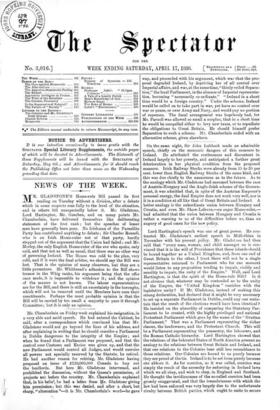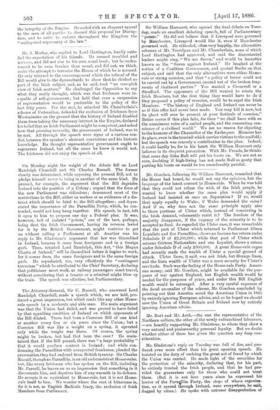Lord Hartington's speech was one of great power. He con-
trasted Mr. Gladstone's earliest speech in Midlothian in November with his present policy. Mr. Gladstone had then said that " every man, woman, and child amongst us is con- vinced that it is the will of Providence that these islands should be bound together as a United Kingdom, and, from one end of Great Britain to the other, I trust there will not be a single representative returned to Parliament who for one moment would listen to any proposition tending to impair, visibly and sensibly to impair, the unity of the Empire." Well, said Lord Hartington, is that the spirit of the Home-rule Bill ? Is it not obvious that, whatever may be contended as to the unity of the Empire, the "United Kingdom " vanishes with the legislative unity P If Mr. Gladstone, instead of making this strong declaration, had declared that it might be very necessary to set up a separate Parliament in Dublin, could any one main- tain that the result of the elections would have been identical P He insisted on the absurdity of comparing the Statutory Par- liament to be created, with the highly privileged and national Protestant Parliament which goes by the name of the " Grattan Parliament." That was a Parliament representing the richer classes, the landowners, and the Protestant Church. This will be a Parliament representing the peasantry, the labourers, and the Roman Catholic hierarchy. Lord Hartington showed that the relations of the federated States of North America present no analogy to the relations between Great Britain and Ireland, and that our relations to the Colonies bear still less resemblance to those relations. Our Colonies are bound to us purely because they are proud of the tie. Ireland is to be set loose purely because she abhors it. As for coercion, as it was called, coercion was simply the result of the necessity for enforcing in Ireland laws which we all obey, and wish to obey, in England and Scotland. He thought the invidiousness of the so-called. coercion had been grossly exaggerated, and that the irresoluteness with which the law had been enforced was very largely due to the unfortunate rivalry between British parties, which ought to unite to secure
the integrity of the Empire. He ended with an eloquent appeal to the men of all parties to discard this proposal for Disrup- tion, and to unite to enforce throughout the Kingdom the " undisputed supremacy of the law."



































